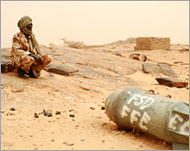United States Department of State (Washington, DC) By Charles W. Corey, Washington File Staff WriterWashington, DC
The United States "strongly condemns" the violence in the Darfur region of Sudan and reiterates that a United Nations peacekeeping force should be deployed there without delay.
U.S. State Department spokesman Sean McCormack made that point August 10 in a statement released to reporters.
McCormack said violence in Darfur "continues to result in the deaths of humanitarian workers and innocent civilians and hinders the distribution of life-saving humanitarian assistance to areas of Darfur."
The United States calls on all groups in Darfur, he said, "to refrain from violent attacks, recognize their responsibilities and abide by the Darfur Peace Agreement (DPA) and the N'Djamena Cease-Fire Agreement." (See fact sheet.)
"We urge all groups to cooperate fully with the African Union Mission in Sudan (AMIS), adhere to United Nations Security Council resolutions, proceed with the full implementation of the DPA and respect international law as it pertains to protecting humanitarian workers and the innocent people of Darfur who have suffered for so long," McCormack said.
The United States is "firmly committed" to peace in Sudan, he added. "The DPA," he said, "provides the best opportunity for lasting security, peace, reconciliation and reconstruction in Darfur" and accommodates the reasonable political, economic and security goals of the people of Darfur.
While recognizing the considerable efforts of AMIS in decreasing the large-scale, organized violence in Darfur, McCormack did acknowledge that "the situation has evolved and become much more complex and difficult."
Consequently, he added, a United Nations peacekeeping force must deploy without delay. "Only a large, robust, mobile and fast-reacting U.N. force is capable of stopping the violence and protecting innocent lives; supporting continued and full implementation of the DPA; and providing a safe and secure environment whereby internally displaced persons and refugees can return to their homes," he said.
The African Union consistently has called for transition of AMIS to a U.N. operation without delay, he pointed out. "Such a transition," he said, "should take place by October 1. We call on Sudan's Government of National Unity to immediately accept a U.N. peacekeeping force and for the U.N. to begin deploying its troops without delay."
Briefing reporters August 9, McCormack said the United States is "deeply engaged" on the Sudan issue. "It's something Secretary Rice spends time on, even in the midst of the crisis in the Middle East. It's something that she has been asking questions about and thinking about, working with Jendayi Frazer, our assistant secretary for African affairs, who has the lead on it."
President Bush held talks on Darfur at the White House July 20 with Salva Kiir, first vice president of the Government of National Unity of Sudan and the president of the Government of Southern Sudan. (See related article.)
Bush also met with Minni Minawi, the Sudan Liberation Movement/Army leader, at the White House July 25 to discuss ways to broaden support for the Darfur Peace Agreement, facilitate its implementation and ensure expeditious deployment of U.N. peacekeepers to Darfur.
(The Washington File is a product of the Bureau of International Information Programs, U.S. Department of State. Web site: http://usinfo.state.gov)
